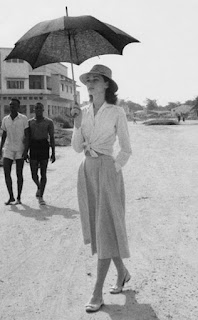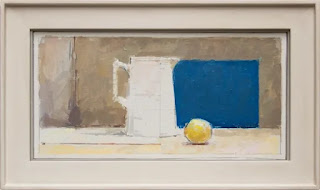So, what did I do next? After a rotten non-education at an expensive boarding school, I did another O Level and A Level at a tutoring establishment. And then I went to Camberwell art school in South London, aged 17.
From the age of about ten I’d been “
going to art school”. My mother wanted me to relive her days at Chelsea Art School in the 30s and 40s, with boyfriends, parties, lunch at the Savoy and tea at the Ritz.
When I was 15 or 16, she took me round to see friends from her art college days. I wore a frilly white blouse and a pink tweed pinafore dress she’d made me, and they were polite about my work. I was sent to talk to them on my own. I had nothing to say. At the official interview for Camberwell Art School they asked me what I read. I said “George Orwell and the Evening Standard”. I didn’t know I was supposed to say something like “Leonardo’s notebooks”. We were given a reading list before the first term and I got my parents to buy all the books (including Leonardo’s notebooks), and I read them. I loved Kandinsky’s Concerning the Spiritual in Art and later wrote an essay based on it that impressed the tutors.
We arrived for the first day bringing work we’d done in the summer holidays. The paintings were pinned up on a wall, and one of the staff critiqued them one by one. He was a small man with a beard and a sneery, nasal voice and was rude about every single painting. He was keen that we shouldn’t paint “cottages with roses round the door”. One student had been “looking at something to do with hobbits and Tolkien”. (She had an innovative technique and didn’t really need instruction from anybody. She’s now a psychotherapist.)
During the Foundation year we were at least given something to do, even if it was make-work. We were sent to the V&A to copy what we liked, and then we came back to a converted school and made collages from our drawings. The tutor in charge used to go to the pub at lunchtime and come back and harangue us and punch us painfully on the arm – especially the female students. There was a little tea bar run by elderly ladies, and a Victorian stove that we gathered round occasionally. Life wasn’t wonderful, but we had no idea how much worse it was going to get.
There was a canteen and a library at the college, but no common room. Students from out of town were found a rented room nearby – though one girl was housed in faraway Sidcup. She referred to the college as “this place” in a fed-up voice and left after the first term – I don’t blame her. There were no evening activities, apart the occasional film screening – just lectures and more classes. (The college is now part of a university with halls and a campus.)
We were set to draw from life, and make studies of plaster casts of antique sculpture. It was the fossil of an approach that had once made sense. In the 19th century and earlier, wannabe artists assembled their studies into theatrical scenes of life in Ancient Rome, Biblical episodes or dramatic moments from Shakespeare. Or, like William Powell Frith, vivid scenarios on railway stations or at race courses. It was also good training for creating book covers, adverts and magazine illustrations – all of which had just been taken over by photography. The rationale had gone, but artists still labelled their works "Study of a Head" – not "Portrait of Doris".
After the Foundation Year came the Painting Course. At first, I didn't get in, but I think my mother pulled strings again. I cried when I was told I'd failed – why? I was already disillusioned, tired and fed up.
What kind of art were they expecting us to produce? The staff loved the Camden Town Group, Walter Sickert and his townscapes, or the works of William Coldstream and the Euston Road School. Social comment was out, and they loathed sentimentality.
It was the late 60s, and the tutors were probably shuddering at memories of a genre that emerged when war artists, deprived of a subject, became embarrassingly mystical – see Evelyn Dunbar. Coldstream, and his follower and our teacher Euan Uglow (see picture), were both excellent painters, now rather forgotten. They left underdrawing and grids partly exposed, and reduced landscapes, still lives, fruit and people to flat planes and straight lines.
We weren’t allowed to paint or draw anything we cared about. We weren’t allowed to make political statements, have opinions or convey emotion. We had to pretend people were no more interesting than a bunch of flowers or a cabbage. The tutors were keen on “objectivity” rather than “subjectivity”. They wanted us to look at what we were painting, not to make up what we thought it looked like. They hated anything “literary”, like the PreRaphaelites, who were having a moment. Paintings should be “painterly”. Other diktats? Don’t use a ruler, and “There’s no black in nature”.
All the best artists have had a thing for pure black. (Christian Furr, Times 2019)
The only portraits we were allowed to like were by Giacometti – ugly, unemotional. When we looked at art we weren’t allowed to comment on facial expressions or the story behind them.
Jane Rosenberg (court artist) trained in the 1970s, when figurative art was deeply unfashionable at art college. “Jane Rosenberg grew up on Long Island in New York and studied art at the University of Buffalo. It was the early 1970s and “abstract art was very in. My teachers always discouraged me from doing realism. They said it’s very passé.” She did it furtively. “I was a closet portrait artist. I would sit at home with a mirror and draw myself.” (Will Pavia, Times 2021)
They told us to “look at the work of X”, which meant “copy X because he’s someone we approve of”. They would never talk about painting techniques, or admit that you could just pick a method and try it. You might go for “squared, interwoven brushstrokes,” as art historian Richard Morris describes. Or you could “block in your masses and then add detail”, like any Victorian painter.
They wanted us to decide on some subject matter (only ever referred to dismissively as “the image” – we were probably meant to select it for purely formal reasons), come up with a technique, and produce a body of work which would be judged at the end of three years. But they never told us any of this. And it required us to decide on a course of action, and have the discipline to carry it out. I'd never done anything like that in my life. What's more, all the education they'd given us so far had been about process, not product.
Nobody mentioned that being an artist was a career, a profession or even a trade. The idea that anybody might buy our work was not on the table. My mother recalled that in her day they were taken on trips round art galleries to see what sold! These days students get seminars on marketing and being taken up by a gallery. (Start a movement, get in the papers.)
I worked on paper because I didn’t have a choice. I had no carpentry skills, had tried to make stretchers but failed miserably. Canvas was out. So were wood or Masonite panels: too heavy, expensive, large, and I didn’t know how to cut them. (Jerry Saltz, artist and art critic)
We were all, including the girls, expected to hammer together and stretch canvases 6 foot by 6 foot. Well, that was out. The only other option was to buy pieces of hardboard from a local wood yard where they'd cut them for you, but this was looked down on. We were supposed to go out drawing carrying paper pinned to a heavy board. We couldn’t do anything on a small scale unless on the Graphics course (it used to be called Commercial Art). We were told to buy a certain kind of portfolio – huge, heavy, cardboard, with no carrying handles. Small girls couldn’t even get an arm round them. On the first day we were advised against “some kind of plastic contraption” – light, with handles. In fact the tutors treated all students as if they were men. And then girls were marked down because their work was too small. I’ve thought this was unfair for 50 years. A student called Terry used house paint in buckets and created a vast painted surface several inches thick. I wonder what happened to him?
Another favourite was Julia, who worked in thin layers that she constantly overpainted, leaving some of the under-layers showing. Catherine created Abstract Expressionist studies of erupting volcanoes, and Debbie painted mantelpieces and their contents. She wrote up in her cubicle “You can change your life. Rilke”. I thought: “How ridiculous, of course you can’t.”
We each had a tutor and met with him from time to time. Mine decided that I was an upper-class party girl and was more interested in socialising and boyfriends than doing any work. I couldn’t disagree because I was so shy I couldn’t talk to adults. I must have seemed completely uninterested. Did he ever wonder what I was doing there?
For the first few weeks of the painting course we were set to depict Platonic solids (square, sphere, cone, pyramid) and meaningless containers: boxes, milk bottles, wine bottles – in grisaille, i.e. shades of grey. It was an exercise so dull and devoid of human interest that some students got fed up and left. Perhaps that was the intention. Many had sensibly gone back to Bolton after the first year.
After the grisaille exercise we were each given a cubicle and pretty much left alone. There was no more need to collaborate with each other – or talk to each other. Once they stopped setting us exercises I had no idea what I was meant to do. It didn't help that we'd been told that "introspection is morbid". We weren't used to asking ourselves if we were happy, and if not, what to do about it.
The tutors must have assumed that I knew that we were supposed to decide on a practice and a subject, and produce a body of work that would be assessed in three years' time. This is really the key. We weren't given projects or tasks, or set to learn anything. Our Art History seminars were just discussions. Few facts were imparted. We were shown pictures and expected to respond. There was an older German student whose response to everything was, "Well, it's very graphic". I just had no idea what to do with myself all day. On the bus there and back, I read Lord of the Rings, the Gormenghast Trilogy, and Cecil Sharp's collection of Appalachian folk tunes.
I felt a complete failure: the glittering social life hadn’t happened, I’d never had a boyfriend, and I felt I had no friends. Over one Easter holiday I gave up hope that I’d ever have either. It was painful. But I did have friends – Penny, Liz, Sarah, Gillian, Catherine – and who was that nice girl from Liverpool who liked CS Lewis and got married in a white lace catsuit?
I burned out. Living in a bedsit didn’t help, either. I hated walking along streets alone. I couldn’t make the effort any more. I stopped speaking to people, so naturally nobody spoke to me. I thought life would be like that for ever. By the end, I only spoke in art history seminars. They were the only bearable part of the experience.
When not in a bedsit, I lived with my parents. From Day One, they never asked me what the other students were like, what I had done that day, who were my friends. At boarding school or university, their children were out of sight, out of mind – but they continued this policy when I was right there, day after day. I didn’t talk about my day to day life to anyone.
And after being at boarding school from age 10, this was my first try at creating a social life from scratch. Nobody had told me it might be hard. The students from Bolton had gone to local schools and had at least grown up with a bunch of friends, but middle-class children were always being sent off to cope with new situations entirely on their own, without any briefing or debriefing. And hang on a minute – my mother had known me all my life. I’d always been painfully shy – why did she think I’d suddenly turn into a social butterfly?
Years later I met Charlie, a fellow student, and compared notes. One night he was so desperate he walked home from his bedsit to Surrey. I used to walk to college to reduce the hours I had to spend there. Another girl walked out of London just to see if she could escape. (She left and went to America.)
We weren’t used to taking an audit, wondering if we were happy, and if not why not. On rare occasions, we tentatively shared our feelings, but we just didn’t know what to do about it. We were 18 or 19. It was the late 60s, we were supposed to be achieving bliss.
Eventually I too decided to leave. But I didn’t dare tell my parents – I was back living with them. For a whole term, I left in the morning, and came home in the evening, pretending I was still at college. I trekked long distances, went to free galleries, took long bus rides, read. One day I bumped into one of the teachers. He said: “I’ve been wanting to talk to you.” I said: “I’ve been wanting to talk to you too”. So we made a date and looked at my pathetic “work”, which he disparaged severely. But we agreed it would be best if I left. However, I couldn’t just walk out – I had to endure an excruciating official exit process, which included laying all my productions on the floor in front of a committee of sneering men with beards. Nobody could think what else I might do apart from “get a job as an au pair”. They probably hadn't wanted to intervene because they thought I was no use for anything.
It was the first decision about my life that I’d ever made for myself and I had no idea what else I wanted to do. My parents were devastated and outraged. They could no longer tell their friends I was “doing a course”. They didn’t have a Plan B. They used to shout at me until I cried. They tried to bully me into going back: “You’ve got to get a qualification!” Well, I wouldn’t have got it. And you can get other qualifications. We didn’t research other colleges or other subjects. We never looked at college brochures or the UCCA book of colleges and courses – I didn’t know they existed and apparently neither did they. They didn’t consult their friends. There’d been no careers advice at school – we were all expected to marry young. Apart from me.
I had no idea what I wanted to do. I'd never been required to think about it before. If I thought about it at all, I thought it would be just as bad anywhere else. I didn’t know how to work out how to do anything. I didn’t know you had to work out what needed to be done. It didn’t occur to me that it was me who had to work it out, or do it. (Though I had managed to leave art school, all on my own.)
I used to see the London College of Printing from the top of the bus, but I never got off, went in and asked what they taught there. I didn't know how. I passed a street market on my bus journey, too, but I never went to it. I only broke my journey to go to the second-hand comic shop. Early on in the ordeal, my mother and I went to the Royal School of Needlework to buy embroidery supplies. I briefly thought: "I might be happier here. I'd be surrounded by girls and I could wear nice, clean clothes every day." But then the thought vanished, and I could barely think at all. Likewise I used to pass the Regent Street Polytechnic opposite the BBC – there were always foreign students standing on the steps. I had a year in hand, I could have done the A Levels that the Convent only pretended to teach (Biology and Geography).
But actually, I’d told my parents I wanted to leave, more than once. They just wouldn’t listen. And afterwards, they rationalised what had happened as “She left art school because she’s lazy and didn’t want to do any work”, not “She left because she was miserable and lonely and sending an 18-year-old to live in a bedsit is maybe not such a great idea”. Other parents might have explained it as a “breakdown”. And you know, I think they’d have been right.
But my parents weren’t just furious because they didn’t know what to do with me, or worried that I might never live independently, they were mortified that I hadn’t had a glittering social life, and more importantly had never had a boyfriend. I might be on their hands for good.
And in fact they had noticed something was wrong. My father said: "You leave late and come back early. And you don't seem to have any friends. You tend to cut yourself off from people." But by that time I couldn't reply, I was too miserable. I was convinced it was the other people who cut themselves off from me. So why were my parents so surprised?
In the end they sent me to secretarial college and I learned shorthand and typing which turned out to be extremely useful when I became a journalist in the 80s. I even recycled that Kandinsky essay. There was a basement where we hung out at lunchtime and between classes. This is where I say, like so many actors who were bullied at school, "And then I discovered I could make people laugh". I didn't know people wanted to laugh, but fortunately they do. I liked learning shorthand and reading Sherlock Holmes translated into Pitman's.
But we just never mentioned art school again. I’ve never talked about the people I knew there. I’ve never really talked about it to anybody (apart from Charlie) – those years were just assumed not to have happened. They didn’t count. They weren’t part of my life story. But as my sister said a lot later: “People have dropped out of college and changed course before – why did they behave as if someone had died?”
Who had died? The person they thought I was going to become – despite all evidence to the contrary. But they thought childhood didn’t count – you developed on the caterpillar, pupa, butterfly principle and your life began when you left school.
There had never been any suggestion I should go to university. But when my sister went, a few years later, she told me: “You could do it – there are people here who are stupider than you!” She gave me the UCCA guide to courses. I’d never even read the Floodlight directory of London evening classes, which was on sale in every newsagent. (UCCA is now UCAS: the Universities and Colleges Admissions Service.) And hang on, why didn't the tutors at Camberwell hand me the UCCA book and suggest I look for a course that might suit me? All my parents did was say "But there must be something you want to do."
I eventually looked up classes in Floodlight, did Art History A Level in six months (it was a year’s course), got an A and went to university. Because I’d worked for three years or more, I got a grant. (Nina Stibbe in Love, Nina went through the same process, finding out about grants through word of mouth. Perhaps “they” didn’t want to advertise this loophole too widely. See also Rupert Pupkin in King of Comedy not knowing there was a comedy scene, or that he ought to submit a recording of his act to the show he wanted to be on.)
I probably could have made it sooner – but then I wouldn’t have got the grant. And it took several years to get over the idea that I would never have friends. I wish I could apologise to those nice people who probably wondered why I wouldn’t hang out with them any more. I had no idea that they needed me as much as I needed them.
One of the Camberwell students moved to Goldsmiths College to do conceptual art. He told us it was the coming thing and the Camberwell approach was as dead as the dodo. He was right – their approach and the painters they revered went sharply out of fashion, and were only welcomed back recently. I started painting and making art again about 20 years ago. I think my old teachers might quite like my stuff.
More about a privileged education here, and links to the rest.












